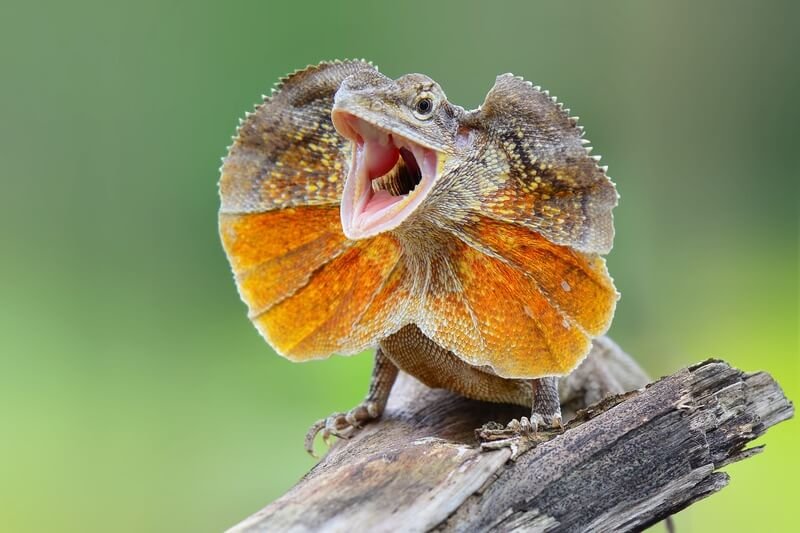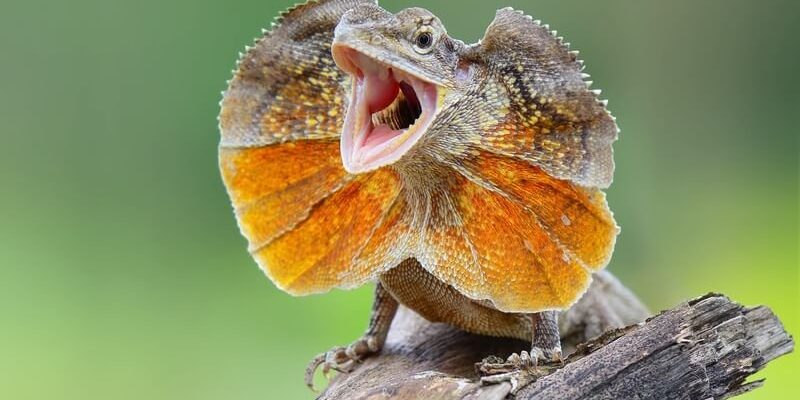
So, how smart is a frilled lizard, really? It’s not just about being flashy; it’s about how these lizards interact with their environment, solve problems, and even communicate. Today, we’re diving into what makes these lizards tick and how their intelligence shines through in their daily lives.
What Makes the Frilled Lizard Unique?
Let’s kick things off with understanding what a frilled lizard is all about. Known scientifically as *Chlamydosaurus kingii*, these lizards are native to the forests and savannas of northern Australia and New Guinea. Their most striking feature is, of course, that impressive frill— a collar of skin that can be displayed when the lizard feels threatened. Think of it as their own personal umbrella of intimidation!
But looks aren’t everything. The frilled lizard showcases a range of behaviors that indicate a certain level of intelligence. For instance, when faced with danger, it doesn’t just run away. Instead, it often stands its ground, puffs up its frill to appear larger, and may even make a hissing noise—kind of like saying, “Hey, back off!” This display is a fascinating combination of instinct and learned behavior, hinting at a deeper understanding of their surroundings.
You might be wondering: do other lizards act like this too? While many reptiles rely on instinct, the way a frilled lizard reacts in a tense situation shows it can adapt its actions based on the threat it perceives. This ability to assess and respond effectively is a key sign of cognitive ability in animals.
Social Interactions and Communication
Frilled lizards are not just loners; they have social lives too! During the mating season, male frilled lizards engage in elaborate displays, basking in the sunlight and showcasing their frills to attract females. This isn’t just a random act; it requires awareness of other lizards’ responses, timing, and sometimes even a bit of strategy.
When they encounter each other, frilled lizards communicate through head bobbing and frill displays—sort of like a dance-off. This interaction shows they can interpret cues from their peers and respond accordingly, which is a prominent sign of social intelligence. Think about it: it’s like knowing when to step into a conversation and when to back off, based on the other person’s reactions.
Additionally, these lizards have been observed to establish territories and can recognize familiar neighbors. This means they can remember specific lizards and adjust their behavior accordingly. In animal behavior studies, this ability to recognize and remember individuals suggests a good level of cognitive processing.
Learning and Problem Solving Skills
Here’s where it gets really interesting: frilled lizards can learn from their experiences. You might think of them as simple creatures, but studies have shown they can be quite resourceful. For example, if they’re trying to escape a predator, they can navigate through obstacles and even employ different strategies based on what’s worked for them in the past.
In captivity, frilled lizards have been known to learn how to use specific objects to their advantage—like pushing aside rocks to find food hidden beneath. This trial-and-error approach highlights a kind of problem-solving ability that’s often seen in more traditionally “smart” animals like dogs or primates.
Imagine trying to get to a snack on the other side of the room; if you had to shift furniture to get there, would you give up? No! You’d find a way. The frilled lizard thinks similarly, which is a remarkable trait for a reptile.
Adapting to Environmental Changes
Another fascinating aspect of the frilled lizard’s intelligence is its adaptability. These lizards are found in various habitats, from dense forests to more open savannas. Their ability to thrive in different environments is a testament to their cognitive skills.
For instance, during the dry season, frilled lizards often retreat to more shaded areas to avoid the heat. This understanding of their need for a cooler environment shows a level of awareness about temperature and safety—something that’s essential for survival.
Moreover, researchers have noted that frilled lizards can adjust their hunting techniques based on the availability of food in their surroundings. If insects are scarce, they might shift to foraging strategies that are less energy-intensive. This flexibility is a smart move in the animal kingdom, where resources can be unpredictable.
Comparing Frilled Lizards to Other Reptiles
When it comes to intelligence, how does the frilled lizard stack up against other reptiles? Many reptiles exhibit survival instincts, but not all display the same level of cognitive complexity. For example, while iguanas have their own unique behaviors, they might not show the same problem-solving skills we’ve seen in frilled lizards.
In contrast, some snake species can also solve problems, especially when it comes to hunting. However, they generally rely more on instinct. Frilled lizards, on the other hand, showcase a mix of learned behaviors and instinctual responses, which gives them a slight edge in the smarts department.
When you look at it this way, frilled lizards are like the “overachievers” of the lizard world. They handle their social situations, adapt to change, and even show learning capabilities that rival some mammals.
Why Understanding Their Intelligence Matters
So, why should we care about how smart frilled lizards are? Understanding their cognitive abilities can give us important insights into reptilian behavior and evolution. It helps biologists and conservationists develop better strategies for protecting these creatures and their habitats.
Additionally, studying the intelligence of frilled lizards can deepen our appreciation for the diversity of animal intelligence. Just because an animal is small and scaly doesn’t mean they aren’t capable of complex thought and behavior. The more we learn about them, the more we realize just how rich and varied life is on our planet.
Overall, by recognizing the intelligence of frilled lizards, we’re also advocating for the conservation of their environments, ensuring these fascinating creatures continue to thrive.
The frilled lizard isn’t just a pretty face with a dramatic frill; it’s a complex creature with impressive cognitive abilities. From their social interactions and problem-solving skills to their adaptability in changing environments, these lizards are more than just reptiles—they’re clever survivors.
If you happen to spot one in the wild, take a moment to appreciate not just its appearance but also its intelligence. The next time someone mentions reptiles, you can confidently share how smart a frilled lizard truly is. It’s a conversation starter that can lead to deeper discussions about the incredible world of animal intelligence!

